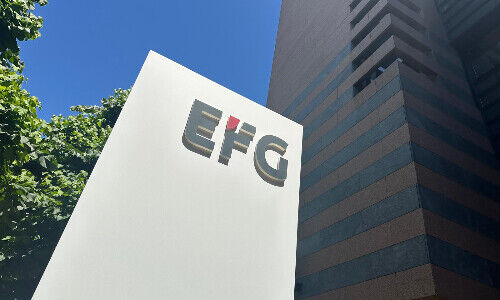EFG International: The Deal After the Deal
The rumors about Julius Baer taking over Swiss private bank EFG International have been put on the back burner. That doesn’t mean there won’t be some kind of deal.
Speculation about a potential takeover of Swiss private bank EFG International by pure-play competitor Julius Baer has been very enthusiastic in recent weeks, maybe overly so. Now, however, there seems to be unanimous agreement that any deal is «dead», at least according to financial industry experts attending the Private Banking Day in Geneva on Tuesday. The main reason? Price.
The reality is that EFG, which is controlled by the Greek-Swiss Latsis shipping family, is in a very strong position. Its stock price is up by 70 percent in just the last two years alone and they are not likely to sacrifice that lightly. Moreover, Julius Baer faces its own set of challenges, including dealing with the aftermath of a credit debacle involving Austrian investor René Benko. Part of that involves appointing a new CEO to replace Philipp Rickenbacher, who was forced to step down last February as a result of the fiasco.
Keeping Secrets
But even though one deal has gone sour, that doesn’t mean that there isn’t another one on the horizon. In Geneva, many hinted about another interested suitor - J. Safra Sarasin. When asked about the new industry rumor, both institutions chose to remain silent. The Brazilian-Swiss financial institution is not only one of the most successful banks in the country - but also one of its most secretive.
It is a well-known fact the Brazilian family that owns it retains a large portion of the bank’s annual profits as a way of building up a war chest. Juerg Haller, chairman of J. Safra Sarasin, regularly maintains that the institution sees itself as a consolidator in the industry, something he mentioned in an interview with finews.ch (German only) in April.
Cash not Shares
Recently, J. Safra Sarasin made headlines by recruiting former Credit Suisse bankers to expand in investment banking and provide additional services for highly wealthy individuals and families. Something more instructive, however, might be the acquisition of Basel’s Bank Sarasin itself over 12 years ago as it serves as an example of how the Brazilian institution operates.
There was a bidding war for Sarasin involving Julius Baer, Raiffeisen, and private equity firm Apax Partners. Surprisingly, J. Safra won because they agreed to pay for the acquisition in cash, not shares, which demonstrated both their determination and financial strength.
New Heavyweight
Their approach has not changed in the meantime, and that aligns with the interests of the Greek-Swiss Latsis family. Besides, it is a well-known fact that both family heads Spiros Latsis and Jacob Safra, the latter being the driving force on the Brazilian side, are already well acquainted.
A combined J. Safra Sarasin (204 billion Swiss francs or $231 billion in assets under management) and EFG International (157.5 billion francs) would manage about 360 billion francs in client assets. This places them ahead of Geneva's Lombard Odier (nearly 300 billion francs in total client assets) although it is still significantly behind Pictet (633 billion francs). Nevertheless, it creates a new and significant Swiss player with a strong presence in Zurich and Lugano (by way of BSI), where EFG International is particularly prominent, as well as Basel and Geneva, where J. Safra Sarasin historically dominates.
Brazilians Among Themselves
Internationally, a merger would have a large impact, particularly in Asia, where both institutions have strong franchises. J. Safra Sarasin employs around 2,500 people at more than 30 locations worldwide, and some of them overlap with EFG International's 40 locations and 3,000 employees. A recurring question would be the integration of EFG International's relatively independent client advisors, particularly given that Sarasin keeps their client-facing staff on a shorter leash.
Interestingly, the Brazilians at Sarasin would encounter their compatriots from BTG Pactual at EFG International. BTG Pactual is the second-largest shareholder group behind the Greek founding family Latsis (with 45 percent), holding nearly 20 percent of EFG International. And at least initially, this kind of cultural affinity could even prove to be an advantage.




























